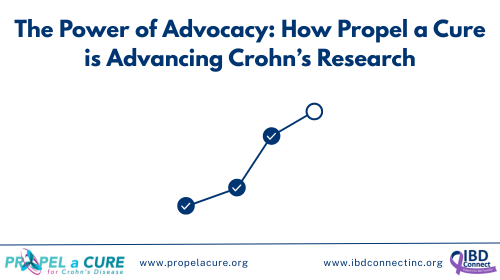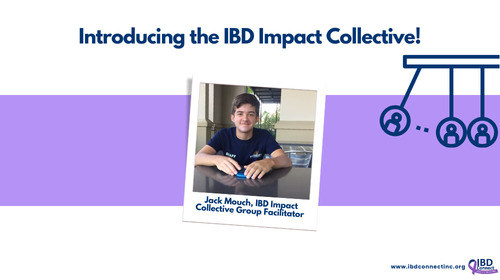The Power of Advocacy: How Propel a Cure is Advancing Crohn’s Research
The Power of Advocacy: How Propel a Cure is Advancing Crohn’s Research


Research different options to find the right pediatrician
Amet mauris lectus a facilisi elementum ornare id sed sed aliquet dolor elementum magnis quisque id ultrices viverra cursus nunc odio in egestas consectetur cras consequat sodales netus pretium feugiat nulla semper senectus bibendum ornare sit adipiscing ut atid viverra donec nunc, donec pulvinar enim ac habitasse fermentum amet praesent atac elementum id sed nibh diam ultrices nibh enim volutpat varius et est sed vestibulum neque.
- Neque sodales ut etiam sit amet nisl purus non tellus orci ac auctor
- Adipiscing elit ut aliquam purus sit amet viverra suspendisse potent
- Mauris commodo quis imperdiet massa tincidunt nunc pulvinar
- Excepteur sint occaecat cupidatat non proident sunt in culpa qui officia
Check credentials and licensing
Lorem ipsum dolor sit amet, consectetur adipiscing elit, sed do eiusmod tempor incididunt ut labore et dolore magna aliqua. Ut enim ad minim veniam, quis nostrud exercitation ullamco laboris nisi ut aliquip ex ea commodo consequat.
Vitae congue eu consequat ac felis placerat vestibulum lectus mauris ultrices cursus sit amet dictum sit amet justo donec enim diam porttitor lacus luctus accumsan tortor posuere praesent tristique magna sit amet purus gravida quis blandit turpis.

Ask friends and family for recommendations
Ornare sit adipiscing ut atid viverra donec nunc, donec pulvinar enim ac habitasse fermentum amet nunc praesent atac elementum id sed nibh diam ultrices nibh enim volutpat varius et est sed vestibulum neque.
Amet mauris lectus a facilisi elementum ornare id sed sed aliquet dolor elementum magnis quisque id ultrices viverra cursus nunc odio in egestas consectetur cras consequat sodales netus pretium feugiat nulla semper senectus bibendum.
“Duis aute irure dolor in reprehenderit in voluptate velit esse cillum dolore eu fugiat nulla pariatur excepteur sint occaecat cupidatat non proident, sunt in culpa qui offi.”
Look for experience in treating your child's age
Duis aute irure dolor in reprehenderit in voluptate velit esse cillum dolore eu fugiat nulla pariatur. Excepteur sint occaecat cupidatat non proident, sunt in culpa qui officia deserunt mollit anim id est laborum.
- Neque sodales ut etiam sit amet nisl purus non tellus orci ac auctor
- Adipiscing elit ut aliquam purus sit amet viverra suspendisse potenti
- Mauris commodo quis imperdiet massa tincidunt nunc pulvinar
- Adipiscing elit ut aliquam purus sit amet viverra suspendisse potenti
Consider location and availability
Duis aute irure dolor in reprehenderit in voluptate velit esse cillum dolore eu fugiat nulla pariatur excepteur sint occaecat cupidatat non proident, sunt in culpa qui officia deserunt mollit anim id est laborum.
Lorem ipsum dolor sit amet, consectetur adipiscing elit, sed do eiusmod tempor incididunt ut labore et dolore magna aliqua. Ut enim ad minim veniam, quis nostrud exercitation ullamco laboris nisi ut aliquip ex ea commodo consequat.
The Power of Advocacy: How Propel a Cure is Advancing Crohn’s Research

Angela Clark
President and CEO of Propel a Cure
When Crohn’s disease enters your life, whether it’s your own diagnosis or through someone you love, it can feel like the ground shifts beneath you. Suddenly, you’re flooded with unfamiliar medical terms, difficult decisions, and an overwhelming sense of uncertainty. At IBD Connect, we understand that feeling all too well. That’s why we’re so proud to now stand alongside Propel a Cure for Crohn’s Disease as organizational partners, united by a shared vision: a future where those living with Crohn’s disease have better answers, better treatments, and ultimately, a cure.
For Angela Clark, President and CEO of Propel a Cure, that vision is deeply personal. When a close family member was diagnosed with Crohn’s, what started as a search for information quickly became a passion for advocacy, research, and hope. Today, she leads an all-volunteer team determined to fund bold, innovative research that targets the root cause(s) of Crohn’s. Angela believes that understanding the cause of Crohn’s disease is the first step toward finding a cure.
In this inspiring interview, Angela shares how personal experience, science, and unwavering determination have come together to drive real change in the Crohn’s community. Whether you’re newly diagnosed, supporting a loved one, or simply hoping for better answers, this story reminds us: progress is possible, and it’s happening right now.
To start, can you introduce yourself and share a bit about your background, your role at Propel a Cure, and what inspired you to become involved in this work?
My name is Angela Clark, and I’m the President and CEO of Propel a Cure for Crohn’s Disease. I was born and raised in Georgia and ended up in South Florida with a detour in the Washington, D.C., area. As a young adult, I enjoyed careers in the federal government and local radio and television before becoming a stay-at-home mom for many years.
I became involved in Propel a Cure about 5 years ago after a family member was suddenly diagnosed with Crohn’s disease with some pretty serious complications at the outset. At the time, I knew very little about Crohn’s – no known family history, etc. – and I was desperately searching for more information about the disease and the latest treatments. Shortly after, I connected online with a wonderful lady named Annabelle Hall whose son had been diagnosed with Crohn’s. She had started a nonprofit to fund Crohn’s research, with a focus on finding a cure. I had never imagined myself so heavily involved in a nonprofit, much less eventually leading one, but I found Annabelle and the specific mission of this organization so compelling and inspiring that I couldn’t say no when she asked me to help.
For those who might be unfamiliar, what is Propel a Cure? What is the mission behind the organization, how was it founded, and what sets it apart from other organizations supporting Crohn’s disease?
Propel a Cure is a grassroots, all-volunteer 501(c)(3) nonprofit led by Crohn’s disease patients and family members. We are a U.S.-based, virtual organization, but have supporters from around the world. Our mission is to raise funds for innovative research that will identify the underlying cause(s) of Crohn’s disease, which we believe is the first step in the development of cures.
When the son of our founder, Annabelle Hall, was diagnosed with Crohn’s, she refused to accept that Crohn’s was incurable. She embarked on a mission to read and learn everything about the disease that she could. Though not a scientist, this gutsy lady started poring through academic journals and even cold contacting researchers in the field. Through this process, she found out that there were lots of innovative, passionate researchers eager to pursue bold ideas and new avenues of research in inflammatory bowel disease (IBD) in the effort to find cures, but lacking the funding to do so. To fulfill this unmet need and to help her son and others like him, she founded Propel a Cure.
There are some great IBD organizations that provide a range of patient support services. There are also other nonprofits that fund IBD research. Some do both. We think Propel a Cure is unique for a few reasons:
- We are all volunteers, and each of us are either Crohn’s patients or have a family member diagnosed with Crohn’s disease. Our Board of Directors also serves as our operational staff; at this time, we have no paid employees. This means our overhead costs are uniquely low, resulting in more than 97% of funds raised going directly to research.
- We fund innovative, early-stage research that zeroes in on the underlying mechanisms and root causes of Crohn’s disease. These are the kinds of bold, exploratory projects that often struggle to secure traditional funding, but they have the potential to unlock game-changing discoveries. The more we understand why Crohn’s develops in the first place, the closer we get to more effective treatments, and ultimately, a cure.
- Beyond raising funds, we try our best to track the latest research in the field and publicize it to the patient community via our newsletters and social media. We also host regular virtual interviews with leading IBD researchers, sharing their insights through our YouTube channel, video library, and social media platforms to keep the community connected to the latest scientific developments.
- Even though we are a small organization, over time, we have been able to forge ties with and build name recognition in the scientific community, which has aided our efforts to understand the IBD research environment.
Propel a Cure is powered by volunteers, many of whom are patients and caregivers. How does this personal connection shape the organization’s approach and work?
I think our status as patients and caregivers greatly help us connect with our constituency. We totally “get” how difficult this disease is and how life-altering it can be. We want cures for ourselves and loved ones just as much as our supporters do, and this drives our passion to push for this goal. From our own experiences, we know how important hope is when dealing with the challenges of IBD, so we present quarterly summaries –direct from the scientists – of the progress being made in the labs our donors are helping. We have been told by a lot of patients and caregivers that they are counting on us, and as fellow patients and caregivers, we take that responsibility very seriously.
Advocating for Crohn’s research is a key part of Propel a Cure’s efforts. How do you define advocacy, and why do you believe it’s essential to accelerating progress toward a cure?
When it comes to Crohn’s research, I would define advocacy as a voice for change. I think the scientific, medical, and business communities need to hear that patients and their families want more than the currently available therapies. We should be working toward cures. While we are deeply grateful for the therapies that exist and recognize how many lives they improve, the reality is that far too many patients still fall through the cracks. Some are refractory to treatment from the start. Others experience a gradual loss of effectiveness or debilitating side effects that make long-term use impossible. Right now, treatment often feels like trial and error, forcing patients to cycle through one biologic after another in search of relief.
Much of current IBD research is focused on medications that suppress the immune system. Propel a Cure believes that more resources should be devoted to uncovering the causes of Crohn’s, which in time will lead to more effective treatments and cures. It is difficult to treat, much less cure, a condition when we don’t completely understand how it starts. By working together, patients and nonprofits can advocate for a change in the status quo and reinforce to those involved with research – both at the technical and financial ends – that cure-focused projects should be prioritized and will be supported.
How does Propel a Cure support research efforts? Can you share any examples of projects, partnerships, or research initiatives you've supported?
Absolutely! As I mentioned earlier, Propel a Cure supports innovative pre-clinical, early-stage Crohn’s research that challenges conventional approaches by exploring factors in the disease that have been overlooked or poorly understood. The data generated from these projects helps researchers validate new hypotheses, which can attract larger funding from major institutions down the line. This crucial early work paves the way for human clinical trials, bringing us closer to more effective treatments, and ultimately, cures. Our project selection process includes a request for proposals, during which we widely publicize our grant competition and encourage submissions from any country and any researcher, whether seasoned or early-career. Award recipients, whose projects are judged on their innovation, impactfulness, and potential for therapeutic and cure-oriented advances, are chosen with the guidance of our Scientific Advisory Board composed of leading IBD clinicians and researchers. Grants are typically awarded for a 2-year study.
To date, Propel a Cure has donated/pledged $359,000 to cutting-edge Crohn’s research. The following are three of the studies we are currently sponsoring:
- $100,000 grant to Promakhos Therapeutics. Their team is researching what they have found to be a deficiency in the mucosal innate immune response in Crohn’s patients and a medication to potentially resolve it.
- $100,000 grant (in partnership with the Mendez Family Foundation) to the Woolston Lab, Northeastern University. This lab is using engineered microbes to both study the role of hydrogen sulfide in IBD intestinal inflammation and to sense and target the inflammation itself.
- $100,000 grant ($79,000 raised) to the Ghosh Lab, University of California, San Diego. Researchers are investigating the impaired partnership between two molecules (NOD2 and GIV) involved in Crohn’s disease and focusing on how to repair it.
What are some of the biggest challenges when it comes to raising awareness and funding for Crohn’s disease research, and how does Propel a Cure help address these challenges?
I think one of the biggest challenges of raising awareness and funding for Crohn’s disease research is that there are still far too many people who don’t realize just how serious a condition it is. I know I didn’t until it struck close to home. As most of you reading this know, Crohn’s isn’t just a “bathroom disease”. It can be life-altering, and its complications can even be life-threatening to some. This lack of knowledge impacts fundraising, so at Propel a Cure, we do our best to publicize the realities and statistics of Crohn’s disease via our website, social media platforms, and interview series with leading researchers. Raising awareness will in turn lead to increased giving.
Another challenge with raising funds for Crohn’s research – and this is for any disease research, not just Crohn’s – is that the results aren’t immediate and can take years. We aren’t yet in the position to share stories of patients who have benefited from our sponsored research. What we do, though, is share stories of gratitude from supporters and the scientists they help underwrite. All of our funding comes from patients and family members, without whom these studies wouldn’t be possible. We also make sure we are as transparent as possible, sharing quarterly progress reports from the research teams so that donors know exactly how their gifts are helping.
Looking ahead, what gives you hope for the future of IBD research? What are some of the most promising areas of Crohn’s research right now?
What gives me hope for the future of Crohn’s research is the number of scientists in the field with groundbreaking ideas who are truly driven by their passion to help patients. Just among the scientists working on Propel a Cure’s sponsored studies, we have an example of a practicing clinician-scientist who transitioned to full-time research to try to find cures and another who made the leap from academia to a commercial lab – even returning a recently awarded $1m grant – because he thought that devoting his talents to translational research was the best way to help patients.
There are definitely bright spots in Crohn’s research right now. Scientists are making remarkable headway in efforts at disease prediction and potentially even prevention. There is a large European-Union funded study recruiting first-degree healthy relatives of patients that will actually offer preventive treatment to those determined to be at the highest risk of IBD. The great thing about this project is that, in addition to learning more about prediction and prevention, by the end of the study scientists are confident they will know a lot more about IBD in general, including findings that will help patients who already have the disease.
Last year’s identification of the ETS2 gene as the “control switch”of inflammatory pathways in IBD by the team at the Francis Crick Institute in London was a big milestone. Also, thanks to the dedicated work of researchers of the STAR Consortium and others, we now have a much better understanding of stricturing Crohn’s disease, with antifibrotic therapies on the horizon. Finally, we’ve had recent advances in disease diagnostics and monitoring with the increased availability of intestinal ultrasound in North America, as well as the rollout of wearable devices that potentially predict Crohn’s flares weeks in advance. Finally, AI promises to revolutionize IBD treatment in the coming years.
How can individuals, families, and other organizations get involved with Propel a Cure’s advocacy and research efforts, support your mission, and help advance your work?
Please visit our website at propelacure.org. There you will find more details on what we do as well as extensive information on the studies we are funding; you will also be able to subscribe to Propel a Cure’s quarterly e-newsletter.
One way to help is to directly support our sponsored labs by making a donation via our website (propelacure.org/donate). Right now all donations are being earmarked for the exciting project at UC San Diego that I mentioned earlier. Our generous supporters have already helped Propel a Cure raise almost 80% of the total cost; every additional gift, regardless of size, will help us get there and fully fund this 2-year study on the partnership of two molecular players in Crohn’s disease.
As a small group, we are always in need of volunteers. If you are interested in helping in this way, please contact us at info@propelacure.org to find out more. Finally, we are on Facebook, Instagram, X, and LinkedIn. Following us, engaging with us, and sharing our message with others on social media is also a terrific way of advocating for a cure and helping to spread our message.
What message would you like to share with families and patients in the IBD community who are longing for better treatment options and, ultimately, a cure?
There is so much we are learning about IBD every day, from genetics to the immune system to the microbiome. Throughout history, better treatments and cures have happened for major diseases and there is no reason why it can’t be the same for Crohn’s disease and other IBDs. Let’s keep pushing together and settle for nothing less.
If you’re reading this and longing for better answers, better treatments, and, one day, a cure, you’re not alone. Progress may not happen overnight, but every conversation, every dollar raised, and every research breakthrough brings us one step closer. The future for those living with Crohn’s is being written right now, and thanks to passionate advocates like Angela and organizations like Propel a Cure, it’s a future filled with possibility.
If you’d like to follow their work, get involved, or support cure-focused Crohn’s research, you can visit propelacure.org to learn more, sign up for their newsletter, or make a donation. Even simple acts, like sharing their mission on social media, help fuel this movement for change.
We’re incredibly grateful to Angela, not only for sharing her powerful story with us today but for her leadership, compassion, and dedication to advancing Crohn’s research and advocacy. Her passion inspires us all and reminds us of the real impact one person can make. We also want to thank the entire Propel a Cure team for their unwavering commitment and for being such valued organizational partners in this vital work. Together, through advocacy, research, and steadfast hope, we can move closer to the answers that so many in the IBD community are waiting for! Stay strong IBD Warrior families!
Disclaimer: Please note that this blog post is for informational purposes only and should not be considered medical advice. For guidance specific to you or your child’s treatment plan, please consult your healthcare provider.
Note: If you’d like to share your own IBD journey, we’d love to hear from you! IBD Connect frequently connects with patients, caregivers, family members, friends, healthcare professionals, advocates, leaders, etc. for guest blog posts and interviews. Please feel free to reach out to Emily Fournier, IBD Connect’s blog writer, via email at emilyfournier@ibdconnectinc.org. Your story matters, and it has the power to inspire others.
Subscribe to our newsletter
Valuable tips, inspiring stories, and updates on events and programs. It’s all value, no spam—just the information you need to stay informed and empowered.



